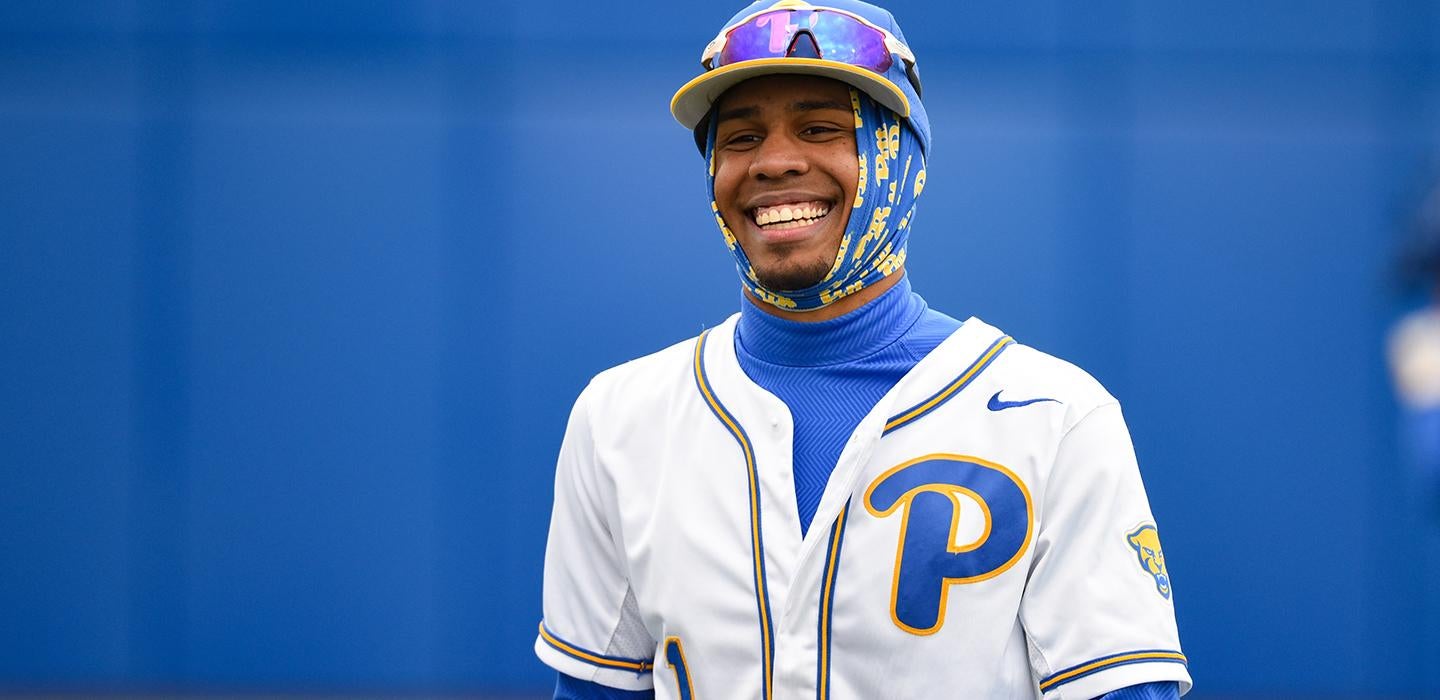
Subscribe to Pittwire Today
Get the most interesting and important stories from the University of Pittsburgh.Tommy Tavarez’s road to becoming a standout infielder on the Pitt Panthers' baseball team was paved with black and gold.
The sport was a major part of his Dominican upbringing, and the sophomore from Brooklyn was introduced to baseball at just age 3.
“After school, we’d spend our afternoons, and even most nights, in the backyard,” he said, recalling batting with his dad and two brothers. “My dad would come out with a little lamp, so we could still hit [after dark].”
Tavarez said that hustle is common among Hispanic baseball players.
“Baseball is a big part of the Hispanic community,” said Tavarez. “From a young age, we’re picking up a bat or talking about baseball.”
For players like Tavarez, whose family is from the Dominican Republic, baseball can be about wanting to provide for your family. “It’s about finding a way to get out of that neighborhood and environment,” Tavarez said. “Baseball is a quick solution because players can sign at the age of 16. By then, you can help your family live a better life.”
Foreign-born players make up about one-third of all Major League rosters, with Latin-born players as the majority, according to the Library of Congress. Players like Juan Marichal, Orlando Cepeda and the Pittsburgh Pirates’ Robert Clemente paved the way for this progress. In 2017, Latinos made up a record 31.9% of the league, with representation on every team.
Despite a childhood filled with stories about the Yankees and Mets and having grown up 5 minutes from the original Brooklyn Dodgers stadium, Pittsburgh entered Tavarez’s baseball journey at an early stage.
“I played in Little League with a team called the Pirates,” Tavarez said. “My coach was Puerto Rican and a big Roberto Clemente fan.” From then on, Clemente, a Puerto Rican Hall of Famer, influenced Tavarez.
“He was a Hispanic legend and opened the doors for a lot of us,” Tavarez said, adding that to now be playing in Clemente’s town is surreal.
A street near Posvar Hall was first named after the Pirates outfielder in 1976 but was renamed to also honor his late wife, Vera, in December.
By the time Tavarez was a top-50 nationally ranked high school shortstop, he had options when considering colleges.
“I visited many schools, but Pitt gave me a city vibe,” Tavarez said. “Everything is fast-paced; you can see everyone like walking fires, heading to class, just like in New York.” The intensity and Pitt passion he witnessed from the Oakland Zoo during a game against West Virginia, he said, also helped “seal the deal.”
Within two months of his collegiate debut last season, Tavarez started in his first game and hit his first home run. Other season highlights included an eight-game hitting streak and scoring three runs. He played in 10 summer games for the Madison Mallards, a collegiate summer league team in Wisconsin, where he had a home run in a 6-1 victory in Kokomo, Indiana.
Tavarez will enter his sophomore season with a .256 career batting average, 20 hits, a .414 on-base percentage, 23 putouts and 49 assists.
But it hasn’t all been easy. He said he felt overwhelmed balancing school and baseball during his first year but commended the baseball staff for providing the support he needed.
His contributions haven’t gone unnoticed.
“Tommy is a wiry, free-spirited baseball player [and a] great guy to have on the team,” said Pitt baseball Head Coach Michael Bell, who was first impressed with Tavarez’s work ethic during recruitment.
“Tommy and his family talked about what he had to do to go to practice every day [like] riding the train in New York City, going to hitting facilities and not a conventional baseball field, but parks and indoor places. The skills he developed [to compete] on a national level really shows his determination.”
Growing up, Tavarez chased after his brothers and cousin, Luis Jimenez — who would go on to play in the MLB for the Los Angeles Angels — and wanted to be better than all of them.
Pitt, he said, is crucial to making that a reality. It is where he works diligently in the classroom and on the field, where he is part of a Pitt student-athlete population that in 2021-21 saw 5% identify as Hispanic.
“Pitt baseball is special, [and yes,] I want to be in the big leagues, call my cousin and be like, ‘You’re not the only one,” Tavarez said. “[No matter what], by the time I get a degree, it’ll be from a prestigious school, one of the best in the nation.”
— Kara Henderson, photography courtesy of Pitt Athletics


